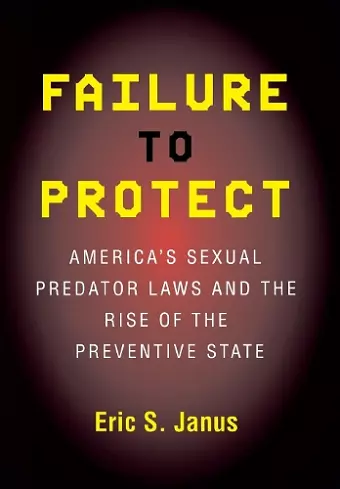Failure to Protect
America's Sexual Predator Laws and the Rise of the Preventive State
Format:Hardback
Publisher:Cornell University Press
Published:22nd Aug '06
Currently unavailable, and unfortunately no date known when it will be back
This hardback is available in another edition too:
- Paperback£18.99(9780801475313)

Most crimes of sexual violence are committed by people known to the victim—acquaintances and family members. Yet politicians and the media overemphasize predatory strangers when legislating against and reporting on sexual violence. In this book, Eric S. Janus goes far beyond sensational headlines to expose the reality of the laws designed to prevent sexual crimes. He shows that "sexual predator" laws, which have intense public and political support, are counterproductive. Janus contends that aggressive measures such as civil commitment and Megan's law, which are designed to restrain sex offenders before they can commit another crime, are bad policy and do little to actually reduce sexual violence. Further, these new laws make use of approaches such as preventive detention and actuarial profiling that violate important principles of liberty.
Janus argues that to prevent sexual violence, policymakers must address the deep-seated societal problems that allow it to flourish. In addition to criminal sanctions, he endorses the specific efforts of some advocates, organizations, and social scientists to stop sexual violence by, for example, taking steps to change the attitudes and behaviors of school-age children and adolescents, improving public education, and promoting community treatment and supervision of previous offenders.
Janus also warns that the principles underlying the predator laws may be the early harbingers of a "preventive state" in which the government casts wide nets of surveillance and intervenes to curtail liberty before crimes of any type occur. More than a critique of the status quo, this book discusses serious alternatives and how best to overcome the political obstacles to achieving rational policy.
Janus makes a persuasive case that by throwing vast resources at a few offenders while hiding the true scope of sexual violence, sexual predator laws do more harm than good. Not only is the public not much safer than it was before civil commitment became widespread, he writes, but we've unleashed a political monster.
* Minneapolis/St. Paul City Pages *Nowhere in Failure to Protect does the author minimize the damage done by criminals.... The problem, Janus says, is that extreme offenders have been incorrectly cast as the archetypal sex criminal. The result has been laws that reflect and reinforce a distorted view of sexual violence, remove resources from more effective policies, and are the signs of a constitutionally questionable 'preventive state.' Janus argues that sexual predator laws reflect a conservative backlash against hard lessons learned from the feminist movement about the systematic nature of sexual violence in society. and the fact that most sexual offenses are committed by a member of the victim's family or social circle. He identifies misconceptions about recidivism and questions 'actuarial' approaches that assign a static risk rating to an individual and ignore changes from treatment, aging, or altered circumstances.
* Chronicle of Higher EducatiISBN: 9780801443787
Dimensions: 229mm x 152mm x 22mm
Weight: 454g
200 pages